12 Top People Managers Who Get It Right
“It is not the genius at the top giving directions that makes people great. It is the great people that make the guy at the top look like a genius,” says business author Simon Sinek in his newest bestseller, Leaders Eat Last. Good bosses, like good leaders, empower their teams to function on their own and once the boss moves on, continued success isn’t necessarily because they left but because they were there.
PPB salutes some of the best people managers in the industry in our annual Best Bosses tribute. The 12 bosses profiled here were nominated by their direct reports and selected by an in-house team based on their ability to coach, mentor and constructively challenge employees while providing a positive and collaborative work environment, leading by example, and encouraging and celebrating success.
Owner, AKWA Apparel (UPIC: AKWA)
City of Industry, California
Number of direct reports: 50
Cool factor: He loves wearing “experimental” apparel designs to work so people can see what they look like on a real person.
Nominator: Steve Pinzon
“Ken has successfully navigated AKWA Apparel from a board-short company to a 100-percent made-in-the-USA corporate apparel company,” says nominator Steve Pinzon, senior partner at Brea Marketing Group and a manufacturer’s rep for AKWA. “I’ve really enjoyed his talent for explaining why the smallest of details is important to the quality process. He knows manufacturing like nobody I’ve ever met. He is also incredibly composed; he never loses his temper, never belittles a competitor or employee and never creates tension in the office. He’s been through some difficult times on a personal level, but he never brings that to work with him. He’s just a class act every day, every week, all year long.”
What is your philosophy for successfully managing people?
Cheng: Provide open communication and be part of the team. By performing team work, not only does everyone support each other, but it helps everyone get involved, including myself. I enjoy listening to everyone’s comments and concerns because this helps me get involved with my employees and it helps the employees to get involved with the company. When the employees are mentally invested in AKWA, they do a more conscientious job.
How do you create a positive culture with your team and those who report to you?
Cheng: In order to encourage my employees to strive for the best, I must also be open to changes. In doing so, this helps employees feel more confident within themselves and the company. It also empowers the employees to try and improve the company. AKWA is 100-percent made-in-USA apparel, so we’re often at a cost disadvantage. If the employees can help improve the company, we all benefit from any efficiencies or product additions they suggest.
What advice can you share with other managers to improve their people-management skills?
Cheng: Always build trust. Think positively, demonstrate appreciation, establish mutual respect and be responsible for your actions. These things will all lead to effective people management. AKWA’s work force demonstrates this, as 75 percent of our employees have been with the company for 10 years or more. AKWA Apparel is known for high-quality, made-in-the-USA garments, but the backbone of the company is our high-quality people.
Director of Sales Operations, Sunrise Identity (UPIC: Sunri635)
Bellevue, Washington
Number of direct reports: 25
Cool factor: Amy is laid-back when she needs to be and more involved when necessary. She doesn’t get in the way of productive work.
Nominators: David Dees, Rosie Fitzgibbon, Stephanie Porter, Vanessa Chung, Jessica Grinaker, Kevin Sanderson, Richelle Simonson, Christina Lopes, Ash Mitchell, Cori Baily, Sasha Torre
“Amy is a big proponent of letting her employees be self-led,” says nominator Rosie Fitzgibbon. “She is against micromanaging and wants her employees to grow from their own learned experiences—both good and bad. She allows the teams to develop their own unique styles that work best for them and only intervenes when absolutely necessary.” Fellow nominator David Dees, project specialist, says, “Amy genuinely cares about us and our lives and success while remaining a good boss who is professional and firm when need be, and is a good leader.” Stephanie Porter, account manager, adds, “She is a great mentor, does not micromanage and empowers others to make decisions. If we go to her with an issue, she wants us to come up with some solutions to present first.”
What is your philosophy for successfully managing people?
Geiger: The first thing I would say is it’s important to hire well. I go by the philosophy ‘hire tough, manage easy.’ I would say skills for the job are important, but fit and attitude are equally important. Hire interesting people that you want to be around. Put the ego aside and don’t be afraid to hire people that are smarter than you and encourage them in their strengths. Also, I look for people who can “hustle.” I use scenarios in my interviews to see how people work. At Sunrise Identity, it’s a fast-paced environment, we have fun, but we work hard. I want to see that fire of motivation in a potential new hire.
How do you create a positive culture with your team and those who report to you?
Geiger: I see managing people like coaching. Set clear expectations and goals with accountability to those goals. Believe the best about your team. When there’s a conflict or issue that arises, remember that most want to work hard, feel valued and do a good job. Listen and seek to understand with that in mind. Cheer for your team and encourage them—be their biggest fans—however, don’t be afraid to hold folks accountable when they are missing the mark. I also set up mentors with newer folks to help foster leadership and empowerment. I like to do fun activities with my team to foster a positive culture. I look for ways to add some fun, bring in coffee or lunch if the team has been working hard. We go on “trend walks” (shopping to see the latest and greatest) three to four times a year. We’ve also really enjoyed afternoons off as a team at a baseball game. Additionally, for important meetings I’ll bring in lunch from a trendy spot.
What’s your advice for other managers to improve their people-management skills? Value curiosity and listening. Information is key to doing your job as a manager. One-on-one meetings are key to gaining insights from your team and sharing information. This is a time to listen; don’t do all the talking or you won’t learn anything. Ask questions, listen and take notes. From there, you can set goals and check in on those goals. It will keep you learning from your team and from there you will be adjusting your goals or strategies for the success of the company. Don’t micromanage. Give people space to be successful. People management is not easy, but it’s so rewarding.
Senior Vice President, Geiger (UPIC: Geiger)
Lewiston, Maine
Number of direct reports: 8
Cool factor: He doesn’t take himself too seriously and maintains a calm demeanor when crises occur.
Nominated by: Lorrayne Mancari, MAS+, who represented his entire team with the nomination
“Jim’s laid-back and relaxed management style, along with his sense of humor, set him apart from other bosses,” says Lorrayne Mancari, regional sales vice president. “Our boss uses his quick, dry wit and sense of humor to keep us from going off the rails at times and he’s well known for his goofy laughter, which we all try to imitate. When you hear it, you cannot help but laugh too.” Mancari describes her boss of 11 years as a leader who encourages teamwork among the sales management team which allows them to leverage the strengths of individuals for the benefit of the team, sales partners and company. “There is an unbroken trust with Jim; trusting and empowering us to make sound decisions but always available to offer advice or discuss strategies whether it’s 7 am or 10 pm.” He’s also hands-on, without being a micromanager, she adds. “He makes a point to visit our regions personally, multiple times a year, to get a pulse of what is happening on the street level.”
What is your philosophy for successfully managing people?
Habzda: I work very hard to create an atmosphere of trust and respect. It is also very important to be genuine so your team feels you really believe in them. Another important aspect is empowerment—the ability to be confident that they can make decisions. Communication is vital to maintain all of this.
How do you create a positive culture with your team and those who report to you?
Habzda: It’s all about the team. If you’re going to engage the best and the brightest and retain them, they’d better think that you care more about them than you care about yourself. They’re not about making you look good. You’re about making them successful. If you really believe that and act on that, it gains you credibility and trust. Trust is a much more powerful, long-term and sustainable way to drive an organization and create a positive culture.
What advice can you share with other managers to improve their people-management skills?
Habzda: Assume the best intent of people, and that they’re really trying to do a good job. People really are trying to do a good job, and they want to be proud of where they work.
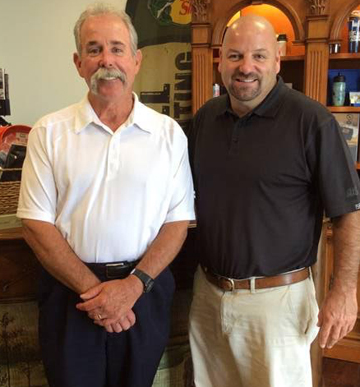
Mike Hadley
Owner/President, Custom Images, Inc. (UPIC: C484859)
Greer, South Carolina
Number of direct reports: 8
Cool factor: He will ask a question to which he already knows the answer to see if you have a different way of approaching the result.
Nominator: Mark C. Thigpen
Mike Hadley has led distributor Custom Images for 25 years. Nominator Mark Thigpen worked for a competitor in his early years in business, but went to work for Hadley 18 years ago. “Mike has been the ultimate mentor, more of a father figure to me,” says Thigpen. “He has taught me not to let emotions get in the way of a business decision; one, if not the best, pieces of advice ever. Anyone who meets him never forgets him. He is everything that I can only hope to be as I grow older.”
What is your philosophy for successfully managing people?
Hadley: Managing people is all about respect. Just keeping that in mind creates a healthy atmosphere for everyone.
How do you create a positive culture with your team and those who report to you?
Hadley: My door is always open. Business is our third priority after God and family.
What advice can you share with other managers to improve their people-management skills?
Hadley: Mistakes are how we learn. Make sure you take care of your client as well as your employee.
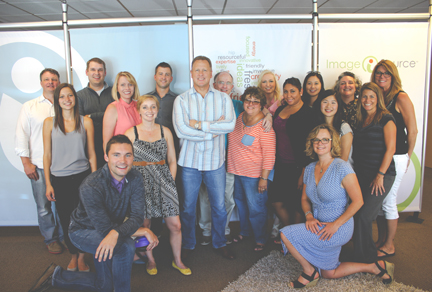
Brian Haner
CEO, Image Source, Inc. (UPIC: IMAGESCE)
Kirkland, Washington
Number of direct reports: 14
Cool factor: He does everything from the garbage, dishes and coffee in the morning, to road trips to distant clients across the state or farther. He leads the team and is on the team.
Nominators: MaryLee Berthon, Lori Horand, Sabrina Tan, Greta Dawson, Jamie Butkowski, Airan Weatherman, Jowed Hadeed
“Brian may be the CEO and founder of our company but he never makes you feel as if he is anything more than a fellow co-worker,” says nominator Greta Dawson, account executive, “but he’s still an influential leader and supports his team by going out of his way to help each employee with whatever they need.” Haner’s nominators describe him as approachable, caring, intelligent, inspiring, passionate, hard working, kindhearted, humble and hilarious. “Brian is genuine in all things and it shows. What you get is real,” says MaryLee Berthon, account executive. Another nominator, Jowed Hadeed, marketing coordinator, says Haner always has a great attitude. “He gives off an energy that is motivating and positive. Even as CEO, Brian stays humble.”
What is your philosophy for successfully managing people?
Haner: Find that perfect balance between creating a fun and friendly workplace, and a fiercely competitive workplace. It’s not an easy thing to do, but we’ve been the most successful when those two are in sync with each other. We want our team to have a blast when they are at work, and we also promote accountability and winning. We need to be highly competitive every day in order to bring in the right projects and clients to drive revenue.
How do you create a positive culture with your team and those who report to you?
Haner: For us, culture trumps everything, so anything we can do to build our culture is a top priority. We are big on team activities inside and outside the office. Our best team event each year is our all-company weekend getaway with everyone, including families. It’s generally a destination resort where we can leave the office setting to just hang out, build personal relationships, get to know the families and get a little crazy.
What advice can you share with other managers to improve their people-management skills?
Haner: Creating autonomy with our team is extremely important, where they are really empowered to manage their business, team, clients, and departments, all with our leadership and guidance along with way. We also make sure to recognize and reward our team for success and performance. With autonomy comes trust, and when trust is present, the magic happens.

Diane Kozel
President, Nyberg, Fletcher & White (UPIC: NYBE0001)
Glen Burnie, Maryland
Number of direct reports: 18
Cool factor: She puts her trust in her employees to get their jobs done.
Nominators: Kathleen Gubbels, Laura Spear, Kristina Watt
“Diane is always fair and knows how to treat people; she is willing to lend a hand to help solve a problem and appreciates our ideas, thoughts and input,” says Laura Spear, a customer service rep who has reported to Kozel for the past 12 years. “She makes our company a fun place to work and is definitely the best boss that I have ever worked for.” Kathleen Gubbels, who has been at the distributor a short time, knows what Spear is talking about. “She sets such a positive work environment for all of her employees. Some bosses can be so secluded and stay locked up in their office. My boss is nothing like that; she interacts with everyone to make sure we are enjoying our work day.” Kristina Watt believes many employees stay at the company because of Kozel. “My boss is very understanding, fair and easy to work for. She is an encouraging person and is willing to try new ways to sell products.”
What is your philosophy for successfully managing people?
Kozel: Well, actually it starts by hiring the very best—and most attractive—people I can find. (I said the “most attractive” part just in case they see this.) But seriously, when you hire the very best, they pretty much manage themselves. Regardless of the volume of business you do, you need smart, dedicated support from a team that treats every transaction and customer like they owned the company.
The trick is to hire people who can and will take care of your customers as good as or even better than you would. On the rare occasions when they do need help, I don’t just tell them what to do, we figure it out together. We do it that way because I respect their skills and expertise, and hopefully they feel the same about me.
How do you create a positive culture with your team and those who report to you?
Kozel: For one thing, I never ask anyone to do something or perform at a level I wouldn’t expect of myself. And I try to set an example in every aspect of our business. There’s that word again “our.” That’s exactly how I think about it. None of us is the owner, but we consider it “our company” as if it were family-owned and operated by all of us. When something goes wrong—yeah, like that ever happens!—we all feel the problem and work to get it right. And, when we do well, we all share in the sense of accomplishment and success from having done a superior job for our customers.
And, in case you’re wondering, it helps not to take everything too seriously. Sure, in our business everything has to be just right or we lose a customer to one of our competitors. We all know that, but life is short and you’ve got to enjoy the work we do, individually and together, or it’s just not worth the long hours we all invest in our jobs. You just can’t spend this much time every day with your team without enjoying their company and the work we do together.
What advice can you share with other managers to improve their people-management skills?
Kozel: It’s not complicated. Hire the most competent. Respect their skills and judgment, and they’ll return that favor. And treat them like family—don’t fake it, because they’ll know. And be sure you have their backs and they’ll have yours.
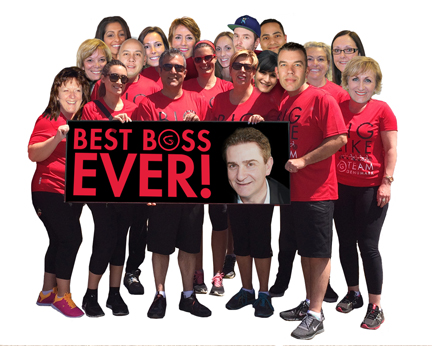
David Lewenberg
EVP and COO, Genumark Promotional Merchandise, Inc. (UPIC: Genum323)
Toronto, Ontario
Number of direct reports: 40
Cool factor: He has served as president of the Promotional Product Professionals of Canada, volunteers for charities and even finds time to play hockey. And he has a story for everything.
Nominators: Stephen Knox, Tracey Clingen, Joan Robertson, Steve Share, Tammy Bookbinder, Murray Sobko, Joelly Lang, Bev Willard, JT Aujla, Mandy Hanson, Emma Freed, Lee Kelso, Trisha Miller, Alexis Sanchez, Brenda MacLeod, Marc Thompson, Elaine Hunter, Marie Clark, Susan Heslop, Helen Walsh
Direct report Joan Robertson started at Genumark about the same time as David Lewenberg and has reported to him for more than 14 years. “He is one of those rare bosses who not only shares his passion for the industry (which is contagious) but also truly cares for the well-being of his co-workers. I wouldn’t trade him for the world!” she says. Another direct report, Bev Willard, says Lewenberg is unique, caring and willing to help anyone. “He does all he can to make sure everyone is up to date with the newest information regarding technology, changes and products. He goes out of his way to help anyone who has a problem.” Murray Sobko says his boss is always positive and approachable. “With a team-first attitude, he genuinely wants the best for all staff and business partners. He is solutions driven and earns the respect of everyone who has the privilege to work with him.”
What is your philosophy for successfully managing people?
Lewenberg: Let people be who they are and put them in a position to best utilize what they are great at. Hire talented people and let them use those talents.
How do you create a positive culture with your team and those who report to you?
Lewenberg: I make sure to always send them a personal note on their birthday. I help them celebrate their wins and try to really be there for them when they have business or personal disappointments. I try to always be truthful with them so they always know where they stand with me and with our company. I try to give people the job and then give them the room to succeed or, unfortunately, sometimes fail. I make sure I am always having fun and I tell lots of stories to try to make the situation more about real life than work.
What advice can you share with other managers to improve their people-management skills?
Lewenberg: Love what you do, admit when you’re wrong and allow people to see the real you.
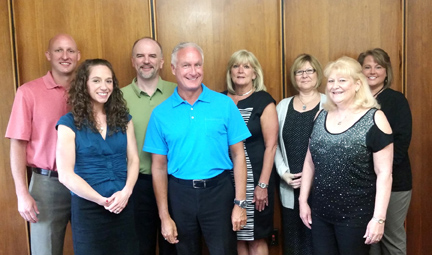
Mike Malinowski
Director of Sales, Gill Studios, Inc. (UPIC: Gill)
Shawnee Mission, Kansas
Number of direct reports: 8
Cool factor: He’s an amazing storyteller. Any time he is relating something, whether it’s work-related or an experience with his family, he paints such a picture that you can see it, relate to it and find the humor in it.
Nominators: Sarah Mann, Kerry George, Rob Baumgardner, Brianne Becker, Brenda Pflumm
“Mike is empowering and motivating,” says Brianne Becker. “He acts as a leader but is still in the trenches with you. It’s very refreshing to work for someone who does what you do, knows what you do and what challenges you are up against. He’s very supportive and has our backs.” Brenda Pflumm agrees. “He’s always positive, supportive and a terrific mentor,” she says. “He never comes across as the boss; he makes you feel like an equal, and encourages your individuality and your strengths.” Kerry George, who has worked for Malinowski for just over a year, says, “He shares our successes and ideas with everyone, which means a lot. It shows that he’s proud of our hard work.”
What is your philosophy for successfully managing people?
Malinowski: Be consistent, be available and be empathetic. All three are needed to build a successful team.
How do you create a positive culture with your team and those who report to you?
Malinowski: First, always listen first before providing any input. Listening sets the foundation for solutions and ideas. Second, hold weekly one-on-one meetings with each team member to check in personally and professionally. We spend much of our lives together and showing that you care supports the culture that has been part of the Gill tradition. Work/life balance is vital in today’s world. Third, support company goals with all actions including hands-on activity. Assist other departments when needed. I wouldn’t expect any team member to do something that I wouldn’t do. Fourth, celebrate successes like birthdays, work anniversaries, monthly goals and big orders.
What advice can you share with other managers to improve their people-management skills?
Malinowski: Put your team first. Make sure they know you are always available and transparent. Focus on goals and stay true to the big picture. Don’t get bogged down in daily management. As Warren Buffett said, “Hire well, manage little.” If your team is spirited and engaged, your job will be amazing too.
Vice President of Sales, Axis Promotions (UPIC: axispromo)
New York, New York
Number of direct reports: 4
Cool factor: She knows how to simultaneously train and manage new employees, and how and when to let go.
Nominators: Nicole Bail, Alexis Quinn
“Lisa has a unique way of capitalizing on her team members’ strengths that lets them take control of the clients and projects, and put their own unique spin on them, while being able to take a step back and do other things to build her business,” says Nicole Bail, who has called Lisa Pine her boss for 14 years. Newbie Alexis Quinn has had a similar experience. “Lisa held my hand tight in the beginning—and as I grow, she knows how to loosen the reins. But yet, she’s still always there when I need her.” She also lauds Pine for her work ethic, which she calls “fierce and contagious. Lisa has a way of teaching, training and breeding success.” Bail adds, “She’s incredibly motivating in a way that motivates others around her. Her clients and employees are incredibly loyal to her.”
What is your philosophy for successfully managing people?
Pine: I think the No. 1 philosophy to managing my team is to understand and acknowledge that I couldn’t be where I am without them. We are the sum of our parts. I am not their boss but rather their mentor. I do not take credit for their accomplishments. I recognize their strengths and achievements privately and publicly. I do not dump work on them. We share the responsibility. They see me in the trenches. I talk to them about their goals and my goals. I teach always—whether it’s how to make a better presentation, how to tell the Axis story or how to lead the clients to close the deal. I respect my team. They know I’m the boss but they see me as part of the team.
How do you create a positive culture with your team and those who report to you?
Pine: Again, we discuss personal and group goals. We share successes amongst our team and company. I motivate them to grow. I share myself with them. We spend time out of the office together. I work with them.
What advice can you share with other managers to improve their people-management skills?
Pine: Listen to your team. Don’t just talk at them. Be open and honest, and provide constructive criticism. Good people want to learn and improve. Ask your team for constructive feedback as well. Be approachable. A good leader is someone who leads by example, not someone who tells others how and what to do. A good leader is someone who is respected by their peers, management and team.
Vice President of Sales, AZX Sport (UPIC: AZXS9472)
Tonawanda, New York
Number of direct reports: 15
Cool factor: Teddy makes employees feel involved in the project as a whole, not just performing that specific function.
Nominator: Chris Hampton
“Teddy leads by example,” says Director of Sales Chris Hampton, who’s reported to Scott for six years. “There are so many times he could ask for a quick task to be done but he takes the time to bring us in and get us excited about the potential if we succeed at this task. I’ve never seen him ask anyone to do anything he didn’t try first.” Hampton characterizes Scott as a glass-half-full guy who is charismatic and positive, even in the most challenging situation. “He always comes from the perspective of the big picture. He designs contests and rewards in super innovative ways, and the best part about working on these challenges is the hype Teddy creates to get us all over the finish line—from killer videos to motivate us to supportive emails and phone calls to generate excitement. Teddy drives the culture of partnership and ‘can-do’ attitude. It’s easy to follow his example.”
What is your philosophy for successfully managing people?
Scott: Understand people’s personal and professional goals. With that information in hand, then give people a clear path on how their goals can be achieved in tandem with achieving the company’s goals as well.
How do you create a positive culture with your team and those who report to you?
Scott: I have an open-door policy and foster an environment of constant improvement at all levels of our business. I lend time to individuals to express new ideas and actually explore the possibility of their potential as opposed to quickly dismissing them as bad ideas. We celebrate company wins as a team, awarding and recognizing people on a frequent basis who go above and beyond. Also, I’m willing to get involved in any aspect of the business.
What advice can you share with other managers to improve their people-management skills?
Scott: Listen to your people. Do not immediately dismiss a new idea even if it goes against your own personal views. Give people the opportunity to try new things and make mistakes. Take time to get to know your people and what motivates them.
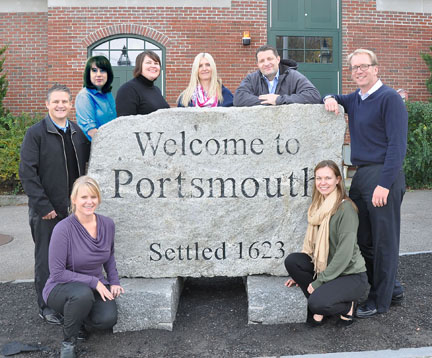
Scott Smith
Director of Global Solutions, Summit Group, LLC (UPIC: summit)
Portsmouth, New Hampshire
Number of direct reports: 6
Cool factor: After a biannual, two-and-a-half-day team meeting, he planned a surprise afternoon of candle pin bowling (it’s a quintessential New England experience) where everyone could burn off stress, rib each other and laugh.
Nominator: Susan Hysen
While Susan Hysen, senior account manager, works in the Silver Spring, Maryland, office, her boss, Scott Smith, and the rest of the team work in the Portsmouth, New Hampshire, office—but she never feels left out. “Scott makes sure that in addition to scheduled team meetings and weekly calls between us, I know I can call him any time—and I do! I do not feel detached and that is mainly due to Scott and the attitude and vibe he encourages,” she says, adding that he fosters a fun, creative and happy work environment—and he’s always encouraging. “He wants everyone’s ideas and feedback, and pushes you to think outside the box. He understands life’s priorities and this work/life harmony he lives trickles down to his team. He offers an excellent balance between taking work seriously but not taking himself too seriously.”
What is your philosophy for successfully managing people?
Smith: Hire well. Management is easy when you are managing the right people. Do what you can to make sure those you hire fit well into the corporate culture of your team and put them into a position where they can use their strengths to be successful. Clearly define roles and responsibilities, and then trust your people to get the job done. I try hard to empower my staff to make decisions and be there to offer support and help them remove obstacles to their success.
What are some things you do to create a positive culture with your team and those who report to you?
Smith: For me, just being myself and staying honest seems to work. I have found that by doing those two things in a sincere way tends to reciprocate the behavior, resulting in a very positive work environment. I am big on team work and try to foster an environment that all team members are valued and recognized for their contributions.
What advice can you share with other managers to improve their people-management skills?
Smith: First, you can be critical without criticizing. No one comes to work looking to make a mistake—how you manage crises or problem orders with your staff can make or break your relationship with them. Second, be active in the daily workday of your staff. Know what they are working on. Understand what is working great and what is not. When possible, take action to help them achieve their goals, solve problems or just listen to their concerns. Be available. Third, manage without micromanaging. Some people need more oversight and direction than others; work hard to find a balance that works for you and each member of your team.

Paul Weller
Director of IT, AIA Corporation
Neenah, Wisconsin
Number of direct reports: 10
Cool factor: He finds time to join the team’s quarterly dinner/happy hour, and spends time with employees outside of work.
Nominators: Tim Brunner, James Wolff, Sharon Zarter, CAS
“I’ve worked with several bosses in my career (both in and out of the industry) and Paul is one of the best,” says Sharon Zarter, CAS, senior IT analyst at AIA. “He manages both the IT department and what the business needs from IT with courtesy and respect. He bridges any gaps with clean communication. He is willing to roll up his sleeves to help all of us achieve our goals.” Tim Brunner, network engineer, admires Weller’s customer service and leadership skills. “I regularly find myself thinking ‘What would Paul do?’ I feel very lucky to have such a knowledgeable leader who empowers us to be independent, hardworking teams and encourages greatness.” IT Support Technician James Wolff calls his boss humble, reasonable and fair. “I can always trust that Paul has my back which helps me focus on doing the right things.”
What is your philosophy for successfully managing people?
Weller: I personally try to follow the servant leadership principle for leading/managing my team. I always look to turn the tables and I ask myself and my staff what I can do for them to help them be successful. I also believe you need to be transparent, open and approachable by your entire team.
How do you create a positive culture with your team and those who report to you?
Weller: Listen more than talk with your team, ask for feedback, and always work to improve how you serve your team. By removing project/task obstacles and getting my staff the right tools to do their jobs, they are able to better able to serve our diverse group of customers. If my team feels successful and their actions lead to better service, then my success comes from their actions.
What advice can you share with other managers to improve their people-management skills?
Weller: I believe everyone should be a lifelong learner. I have found there are always better ways to lead and manage as we mature and the workforce changes. By listening and better understanding each team member and what drives them at work and at home, I have built a better personal connection and I can work to help each team member grow personally and professionally.
Who’s Your Bestie?
Tell PPB about the best boss you’ve ever reported to and why that person holds the distinction. We’ll run your comments in an upcoming issue. Email: TinaF@ppai.org
October 16 Is National Boss’s Day
Do you have a great boss? Remember to thank him or her on National Boss’s Day, Friday, October 16. A thank-you goes a long way.
Here are a few ideas:
• Leave a handwritten thank-you note on your boss’s desk pointing out what you appreciate about him or her. It’s a refreshing alternative to emails, tweets and texts.
• Send a note to your boss’s boss pointing out the attributes that make your boss so terrific.
• Offer to do a small task for your boss to free up an hour on this special day, such as an errand or a report.
• Do something unexpected for your boss such as tidying up the office space.
• Post a short and simple note of praise about your boss on your social media page.
• Bring in a homemade lunch for your boss or get your boss’s favorite takeout and bring a homemade dessert.







